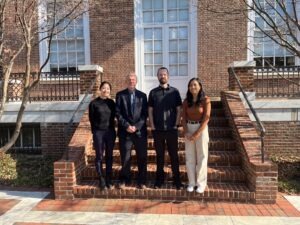A team led by Hopkins engineers has developed a method to convert organic waste into medium-chain carboxylic acids (MCCAs)—crucial ingredients in industrial lubricants, bioplastics, food additives, and personal care products. The new technique offers a sustainable alternative to current MCCA production methods that pose major environmental and economic hazards, such as destroying rainforests.
“In addition to destroying the rainforest to create palm oil farms, the process to extract the MCCAs from palm oil isn’t environmentally friendly. We sorely need alternative methods,” said research team member Michael Betenbaugh, a professor of chemical and biomolecular engineering at the Whiting School of Engineering.
The effort recently received funding support from BioMADE, a US Department of Defense-funded manufacturing institute focused on accelerating biomanufacturing technologies for chemical products.
The group’s method can use a variety of organic waste sources, including agriculture, dairy farms, and distilleries, making it suitable for use in a variety of settings.
“This is organic waste that otherwise would not be used for any purpose. It would likely end up somewhere like a landfill, so it’s important to find a way to create something useful,” said team member Shilva Shrestha, an assistant professor of environmental health and engineering.
The group’s method comprises two phases. First, the microbial fermentation of organic waste, during which microorganisms break down organic molecules and extract chemical energy—a process that involves hijacking the cells’ natural microbial pathways to make liquids that contain MCCAs. This phase takes place in a bioreactor, a circular vessel that provides an optimal environment for biological reactions to occur.
“We call this top-down microbiome engineering. Essentially, manipulating groups of microorganisms in the form of a microbiome that will create end products containing MCCAs when they interact with the organic waste,” said Shrestha.
Phase two is downstream separations, during which leftover liquids are further reduced until only MCCAs remain. Conventional methods for separating liquids in this way are cumbersome and time-consuming. Team member Yayuan Liu, an assistant professor of chemical and biomolecular engineering, proposes using electrochemical reactors to do the job instead.
“This method is more straightforward, and since it uses electricity, it doesn’t create any excess waste,” Liu said. “Liquid-liquid separation involves solvents which can leave leftover waste. Our goal is to get pure MCCAs with nothing extra.”
The system developed by Betenbaugh, Shrestha, and Liu–all affiliated with the Ralph O’Connor Sustainable Energy Institute (ROSEI)–has gained momentum through a collaboration with Robert Price, director at Technology Holding, a research and development company with a focus on energy and environmental solutions. The partnership allows the Hopkins trio to upscale their work, testing the new method’s performance in larger bioreactors to accelerate its readiness for real-world implementation.
“We believe that our process will be especially valuable in low-resource environments, where it’ll be extremely helpful to create these MCCAs,” Betenbaugh said. “That could mean grocery stores or distilleries in urban environments like Baltimore City or farms in more rural agricultural settings. Because it works with a variety of organic waste sources, we think our system can work in a wide range of environments, and we’re excited to test it out at a larger scale very soon.”

